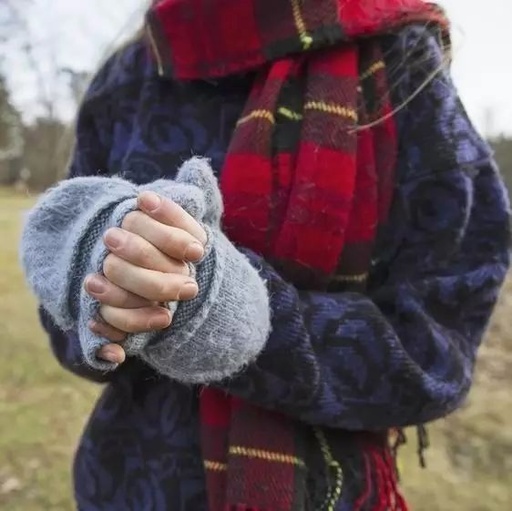Pengpai News Reporter Xiao Bei
After the Cold Dew (Han Lu) solar term, the weather in Shanghai suddenly turned cold, dropping ten degrees overnight. In the bleak autumn wind, some people feel cold all over, especially with icy and numb hands and feet. So, what causes cold hands and feet? What methods does Traditional Chinese Medicine (TCM) offer for treatment?

Identifying the Constitution Behind Cold Hands and Feet
Dr. Fang Hong, Chief Physician of the TCM Preventive Health Department at Longhua Hospital affiliated with Shanghai University of Traditional Chinese Medicine, believes that cold hands and feet, or cold intolerance in the limbs, must first rule out pathological symptoms, such as congenital arterial dysplasia or Raynaud’s syndrome, which can cause coldness in the peripheral blood vessels. Raynaud’s syndrome is a group of symptoms characterized by episodic pallor, cyanosis, and then redness of the fingers (or toes) triggered by cold or emotional stress.
Next, it is essential to identify the constitution, which can be improved through medication and dietary therapy. Individuals with Yang deficiency tend to be cold intolerant, easily experience diarrhea, prefer warm foods, feel cold in the back, and are sensitive to wind, with a pale and swollen tongue coating. Those with Blood stasis may have dark lips and complexion, and often present with purple spots on the sublingual veins. Additionally, women with Liver Qi stagnation and significant emotional fluctuations are also prone to cold hands and feet.
As the autumn weather cools, individuals with a balanced constitution generally do not feel cold, while those with imbalanced constitutions often have poor lifestyle habits. For instance, being easily exposed to cold, using air conditioning excessively in summer, consuming cold drinks, and wearing thin clothing during seasonal transitions can lead to prolonged cold invasion and Yang deficiency. Some individuals may also lack exercise, resulting in poor blood circulation in the limbs. Therefore, improving lifestyle habits is crucial for alleviating symptoms.
How can TCM treat cold hands and feet symptoms?
Dr. Fang suggests that individuals with Yang deficiency who are cold intolerant can consume warming foods and herbs such as ginger porridge, Sichuan pepper, and cinnamon. Those with Kidney deficiency may take Jin Gui Shen Qi Wan (Golden Cabinet Kidney Qi Pill) or You Gui Wan (Right Returning Pill) to tonify Kidney Yang. For individuals with Blood stasis, dietary remedies like hawthorn porridge, hawthorn cake, and wine-soaked onions can be beneficial.
Moreover, different constitutions can benefit from various herbal baths or foot baths. For Yang deficiency: use herbs like dried ginger, Aconite (Fu Zi), and Codonopsis (Dang Shen) to warm Yang and tonify Qi. For Blood stasis: herbs like Angelica (Dang Gui), Salvia (Dan Shen), hawthorn, and safflower can invigorate blood circulation and resolve stasis. For those with mixed constitutions, moxibustion can infuse the body with warm energy. If symptoms persist despite herbal treatment, further diagnosis in neurology may be necessary.
Additionally, individuals with cold hands and feet should pay special attention to warmth during colder weather, wearing gloves, knee pads, and scarves to fend off the cold, and should avoid wearing skirts for the sake of appearance.
Distinguishing Between True and False Cold Intolerance
Dr. Wu Huan, Deputy Chief Physician of the Traditional Chinese Medicine Department at Shuguang Hospital, states that the causes of cold hands and feet can be categorized into organic diseases, such as hypothyroidism, anemia, kidney disease, and heart disease, which make patients more susceptible to cold; these require hospital examination to rule out underlying causes.
Another category is functional diseases. From a TCM perspective, cold and numb hands and feet are often related to Qi and Blood issues, caused by Qi deficiency and Blood deficiency leading to poor blood circulation and insufficient blood volume, which is termed “true cold intolerance.” Individuals with Yang deficiency can take warming herbs like Aconite, cinnamon, ginseng, and deer antler, or consume warming foods like lamb soup and ginger tea to combat the cold. Those with Qi and Blood deficiency should take herbs like Angelica, Astragalus (Huang Qi), and ginseng to tonify Qi and Blood. A recommended dietary remedy is to brew red dates and dried ginger tea, adding honey for flavor and digestive benefits.
There is also a condition termed “false cold intolerance,” which falls under TCM’s “Four Reversal Syndromes,” where the limbs feel cold while the body does not. Consuming warming foods like red dates, longan, and ginger may lead to constipation or acne in these individuals. They often lack exercise, are typically thin, and have little subcutaneous fat, making them unable to withstand the cold. This is particularly common among some female office workers who sit at computers for long periods, leading to poor blood circulation in the limbs. It is recommended that these women set a phone alarm every hour to remind them to get up and move to improve peripheral circulation.
Very thin girls should “gain autumn fat” in the fall by consuming more meat and high-sugar foods to increase subcutaneous fat for cold resistance. False cold intolerance may also be associated with irritability and Liver Qi stagnation, requiring herbs that soothe the liver and relieve stagnation, such as Xiao Yao Wan (Free and Easy Wanderer) and rose tea.
This issue was edited by Li Xiaojun
Recommended Reading
Electric Vehicle Runs a Red Light and Gets Hit; Traffic Police’s Punishment Decision is Satisfying
Is it Shameful for a Doctor Graduated from Peking University and Tsinghua University to Open a Barbecue Shop? His Response is Impressive
Attention! High-speed Rail Seats Can Now Be Selected in Advance

